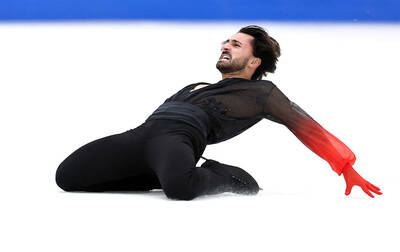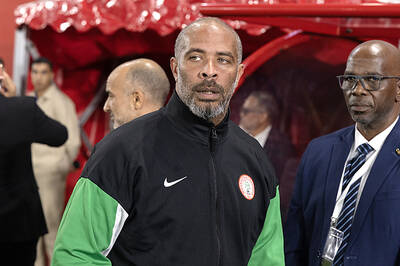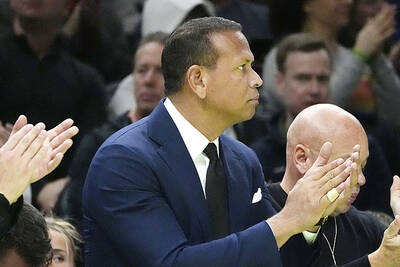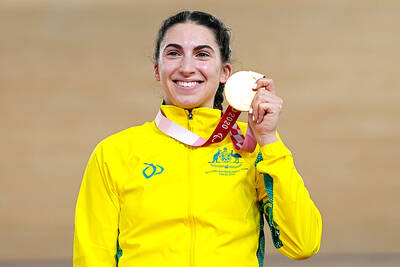For ESPN, the inexorable result of 26 years of feeding sports to millions of people and fueling fans' desires for ever bigger screens is surprisingly small.
It is, in fact, really small, yet designed to drive the supersized ESPN brand further into the sports zeitgeist.
ESPN has crammed everything it has learned about television into the guts of a black Sanyo cellphone with red keys and a 2.1-inch screen that dishes out scores, highlights, news, trivia and fantasy content with depth and zippy clarity. In time, it will deliver full games shrunk to 1/15th or 1/20th their usual television size.
This is Mobile ESPN, an empire in a pocket, a digitally endowed companion with a tiny Dickie V. or a wee Chris Berman available at a button's push for those minutes and hours spent away from one's television.
"What's next, implants?" said Keith Olbermann, a former anchor of SportsCenter who is now the host of MSNBC's weeknight Countdown show. "They were once bound by cable. It was a cable success. Now, they're detaching from cable. Just jam it in your pocket, and you're ESPN."
The idea behind Mobile ESPN was to make the omnivorous sports media empire more available than it already was by merging what fans expect on TV and online at ESPN.com into a pre-eminent third screen in sports.
"Our mission is to be everywhere fans watch, talk, debate and enjoy sports," said Salil Mehta, executive vice president of ESPN Enterprises. "We don't believe in one screen. We believe in all three."
It was Mehta, then an executive with Walt Disney Co, which owns 80 percent of ESPN, who suggested last year that ESPN develop a cell phone. Eventually, ESPN would customize an expensive cellphone with Sanyo, and sign with Sprint Nextel to carry the service on its high-speed network.
"Life will never get in the way of sports again," Mehta said, echoing a planned advertising campaign.
ESPN's aspirations have grown as the cell phone market has matured; there are 194 million wireless phone users in the US. "For ESPN, it means trying to get people to leave another carrier, and the way to do it is with something different," said Linda Barrabee, a senior analyst at the Yankee Group, a technology research firm. "The market is primed for differentiation."
ESPN's desire for cellular success is part of its yen for sports-world primacy. In 1979, few could envision the growth of ESPN into a media behemoth that inspires awe, jealousy and contests to be a SportsCenter anchor." But one ESPN network begat many more; a radio network was created; so were ESPN.com, the most visited sports Web site; a magazine; a restaurant chain; trading cards; and books.
Along with it all came the highest monthly subscriber fee for any basic cable channel, ferocious marketing, an enormous cash flow and a healthy ego. An online Mobile ESPN ad proclaims that the new phone is: "The Greatest Invention in the History of the World. Ever."
Hyperbole aside, ESPN says that getting into the cellular business is a necessary step to serve its audience beyond continuing to feed its sports data to Verizon, Sprint, Cingular and T-Mobile wireless customers.
"This is a time when consumers want whatever they want wherever they want it on the device they want," said John Skipper, ESPN's executive vice president for content. "It's no longer about just sitting in front of the TV."
Time was, tube-gazing was what ESPN and television were all about, but computers, the Internet, cellphones, digital video recorders and iPods have transformed how and when people view television, regardless of the set's size.
Manish Jha, the senior vice president of Mobile ESPN, said, "The idea is to create an immersive experience" that looks and sounds like ESPN, that offers familiar content, music and personalities in a hand-held form.
The ESPN experience is reachable through one click on the phone, and advances into an easy-to-navigate sports universe of colorful graphics and clear video clips created in ESPN's digital center in Bristol, Conn. Close-ups are preferable to long shots on the small screen to enhance the clarity of video that currently transmits at about half the speed of regular television.
"We wanted a total sports ecosystem," Jha said.
Rarely has television been described in terms more suited for Jacques Cousteau. But sports fans have for decades made ESPN one of their natural habitats. ESPN estimates that 97 million people "touch" (for at least 10 minutes) one of its services each week.
Mobile ESPN is simply the latest way to expand its well-used ecosystem while simultaneously serving the traditional sofa and barstool set.
Expecting people to watch three-hour games on a 2.1-inch screen is not a major concern or an opening strategy for the cellular ESPN. Officials believe that users will usually dip in and out for a few minutes at a time, and that long-form live events will in time attract an audience.
ESPN has been amassing wireless rights to games for several years, but it is working on the technology required to transmit the games from cell towers to phones.
"I think some customers will watch, but who will and how many?" Mehta said. "And what's the right package?" Whether users will pay extra to watch Monday Night Football or Sunday Night Baseball has not been decided.
Robert J. Thompson, director of the Center for the Study of Popular Television at Syracuse University, said that in pursuing the mobile option, ESPN has recognized the portability of sports content.
"In an age when we're offered bigger, wider, more definition screens, sports works perfectly in airports, doctors' waiting rooms and commuting on trains," he said. "Fans want wider screens to watch sports in all their glory, but it's not a contradiction that they can watch wherever they are."
It will be costly to watch, or touch, Mobile ESPN. It is selling at Best Buy stores in four test markets for US$399.99 after a US$100 rebate; monthly service costs from US$64.99 to US$224.99. Sometime before Christmas, the phone is expected to be sold on ESPN.com; soon after Best Buy's full retail beginning in February, lower-priced handsets will be available.

France’s Kevin Aymoz snatched the men’s title at Skate America on Saturday, winning his first grand prix title with a battling free skate, while short program leader Kazuki Tomono faltered. It was an emotional triumph for Aymoz, who made his grand prix level debut in 2017, with seven prior podium finishes, but no gold. He had struggled with a painful foot injury since a disappointing 10th-place finish at Skate Canada last month. “It was so difficult,” the 28-year-old said. “After Skate Canada I wanted to give up so much and today I’m here and it’s so beautiful to be with my friends competing

Nigeria’s soccer coach has accused the Democratic Republic of the Congo (DR Congo) of practicing “voodoo” after his squad’s hopes of qualifying for next year’s FIFA World Cup ended in a penalty shoot-out loss in the African playoff final. DR Congo and Nigeria drew 1-1 after extra-time in the tie in Rabat, Morocco, on Sunday and the central Africans won 4-3 on penalties to book a place in inter-confederation playoffs in Mexico in March next year. In his post-match remarks to journalists, coach Eric Chelle said a member of the DR Congo team “did some voodoo, every time, every time, every time.” “That

A start-up’s entry into prediction market trading is raising fresh questions about the involvement of NBA owners in sports betting. The start-up, Mojo Interactive Inc, was cofounded by Alex Rodriguez and Marc Lore, the owners of the NBA’s Minnesota Timberwolves and the WNBA’s Lynx. Mojo has started trading on the outcome of sports games on the prediction market exchange Kalshi, an arrangement that is now being reviewed by the NBA. Mojo began trading event contracts tied to sports during the NFL season this fall, according to Mojo CEO Vinit Bharara. Mojo has yet to trade on any NBA games, Bharara said in

Australian cyclist Paige Greco, a Paralympic gold medalist, has died. She was 28. A joint statement by the Australian Paralympic Committee and Cycling Australia said that Greco “passed away in her Adelaide home after experiencing a sudden medical episode” on Sunday. “Paige meant everything to us,” her mother Natalie Greco said. “Her kindness, her determination and her warmth touched our family every single day. She brought so much joy and pride into our lives, and the pain of her passing is something we will carry forever, “ Natalie Greco said. “While we are devastated by her loss, we are incredibly proud of the person she